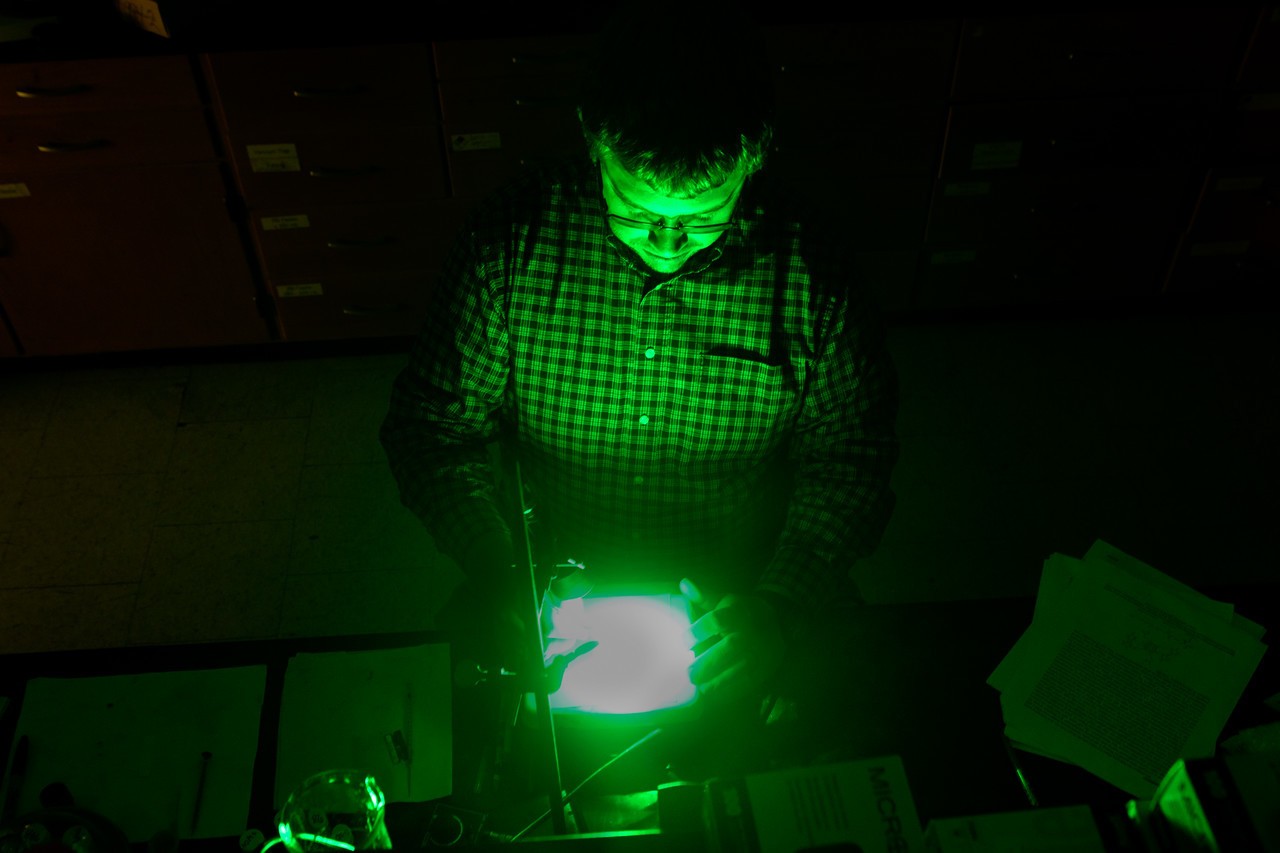
Doctorate
Photochemical Sciences
Bowling Green State University boasts one of the best Ph.D programs in the world in photochemical sciences dedicated to photochemistry and photophysics-related sciences. This unique doctoral program covers the photochemical reaction that occurs when light energy interacts with molecules and photo-actuated smart materials.
The Ph.D in photochemical sciences equips graduates to:
- Tackle revolutionary research on solar power
- Develop light-activated medical breakthroughs in cutting-edge pharmaceutical labs
- Create new sustainable materials to power the technology of tomorrow
Many graduates discover their calling in academia, government and industry. They lead progressive research initiatives and inspire the next generation of scientists.
BGSU biochemists investigate protein interactions using photo-labeling and DNA/RNA aptamer biosensors. Analytical chemists work on chemosensors and bioassays using fluorescence and other methods. We also have significant expertise in semiconductor quantum dots, photophysics and spectroscopy, photo-degradation of polymers aimed at waste remediation, and more.
Program highlights
- Expert faculty. Learn from an international cadre of experts in various aspects of photochemistry and photophysics. Faculty stands out in fields like optical spectroscopy, materials chemistry, semiconductor quantum dots physics, computational chemistry, single-molecule spectroscopy and biophysics.
- Financial support. Bowling Green State University and the Center for Photochemical Sciences provides full support for all graduate students in good standing. This includes tuition, fees and a competitive stipend.
- Groundbreaking research. Stand at the forefront of photochemistry innovation by participating in pioneering research at the local, regional, national and international levels.
- Strong industry interactions. BGSU connects you to global industry leaders whose research, development and product initiatives increasingly rely on photochemistry. Our students are employed by the pharmaceutical, semiconductor and chemical industries, in national laboratories and many universities.
- Renowned advisory board. Faculty members are advised by an interdisciplinary scientific advisory board composed of distinguished chemists, physicists, and biologists in industry and academia. These experts develop the Center’s policy, planning and long-range goals.
- State-of-the-art facilities. The Center for Photochemical Sciences is located in Overman Hall with research laboratories located in the Physical Sciences Laboratory Building. The center offers access to specialized equipment and facilities that support cutting-edge research in photochemistry and physics. This includes major installations for high-field NM, high-resolution mass spectrometry, UV-VIS, NIR, IR, IR transient absorption and visible fluorescence measurements on the femtosecond to millisecond timescales.
- Personalized support. The Center has 14 primary faculty and 50 graduate students – large enough to offer ample research opportunities but small enough to foster a focused learning environment with a high faculty-student ratio.
- Connect with other chemists. Attend popular chemistry conferences, workshops, seminars and speakers series – on campus and beyond. Network with friends and colleagues at the Ohio PhotoChemical Society (OoPS) meeting.
Career opportunities
Graduates of the BGSU Ph.D. in photochemical science program have gone on to work for prestigious employers, such as:
- Intel
- Merck
- Takeda Pharmaceutical Company
- J&J
- PPG
- FBI Hazardous Materials Response Unit
- Dept. of Justice Bureau of Forensics
- Prominent research colleges and universities across the world
A doctorate in photochemical sciences offers an in-depth understanding of the power and processes of the chemistry and physics that involve light. This includes solar cells, OLEDs, quantum-dot technologies, and emerging light-based technologies that increasingly shape our world. This knowledge drives advancement in fields like bioassays, medical imaging, environmental protection, drug development and so much more.
Graduates with a Ph.D in photochemistry have their pick of exciting career paths in industry and higher education. Many become university professors or researchers, leading their own laboratories, mentoring students and pushing the boundaries of what’s possible through the science of light.
Others pursue rewarding work in lucrative industries:
- In the renewable energy sector, they develop more efficient photovoltaic materials to improve solar energy sourcing.
- In the medical field, photochemists find roles in biomedical research and pharmaceuticals, including photodynamic therapies or the development of light-activated drugs.
- Within environmental science, photochemistry can reveal new light-activated processes to break down harmful pollutants.
- In material science, photochemical methods can be applied to create new materials for smarter tech and cleaner industrial processes.
The work you do can have tangible, positive benefits for society. Photochemical scientists are uniquely positioned to discover creative new solutions as the world confronts major challenges such as climate change, disease and energy shortages.
Career paths
- Research scientist in chemical industry R&D
- University professor
- Solar energy scientist
- Biophotonics scientist
- Chemical engineer
- Pharmaceutical scientist
- Environmental scientist
- Toxicologist
- Expert witness/consultant
Quick Facts from the Bureau of Labor Statistics
Curriculum
The interdisciplinary curriculum for the Doctor of Philosophy in Photochemical Sciences includes carefully developed coursework and a large research component. Although the applications of the research are broad, the primary focus is on the study of the interaction of light with physical, chemical and biological systems.
Students must complete at least 90 hours of graduate credit (at least 60 beyond the master’s degree) in chemistry and physics. These hours include a series of required core courses in chemistry, photophysics, photochemistry and spectroscopy. These can be tailored to include elective courses that meet your specific strengths and interests.
Most students complete the photochemistry Ph.D degree in 5 years.
A preliminary examination to qualify for doctoral candidacy is administered when you near completion of 60 credit hours. This consists of the written preparation and oral defense of an original research proposal.
The research activities of doctoral candidates focus on independent research projects under the guidance of their research advisor and dissertation committee and culminate in a dissertation. Up to 30 hours of dissertation research can be applied toward the degree.
The final exam for the degree is an oral defense in which you present a seminar open to the public on your research and defend the results and conclusions before the dissertation committee.

Sample courses
- Quantum Chemistry
- Organic Spectroscopy
- Photochemistry and Photophysics
- Seminars Photochemical Sciences
- Special Topics in Spectroscopy
Areas of research
Bowling Green State University is a leader in photochemistry and photophysics research. Our faculty’s research is routinely published in the highest-impact, peer-reviewed journals and leads to patents and licenses.
Highlights of our research include:
- Molecular photochemistry and photophysics of novel chromophores
- Semiconductor quantum dots
- Single-molecule spectroscopy and imaging
- Hybrid metal-organic photonic materials
- Organic semiconductors, electroluminescence and sensory materials
- Solar energy capture, conversion and catalysis
- Biophotonics
- Computational mechanistic photochemistry
- Photopolymers and photopolymerization
Admissions
Applicants who show evidence of outstanding undergraduate education and research ability may enter directly into the Ph.D program after completing a bachelor’s degree in chemistry, biology, physics or related disciplines. A master’s degree in the above fields and the degrees from integrated BS-MS degrees are also accepted.
Follow the instructions outlined in the Graduate Admission webpage to apply.
The Ph.D. in photochemical sciences is a program in the Department of Chemistry within the BGSU College of Arts and Sciences.
Accreditation
The Photochemical Science program most recently underwent Program/Cluster Review during the Academic Year 2019/20.
Bowling Green State University [BGSU] is accredited by the Higher Learning Commission. BGSU has been accredited by the Higher Learning Commission since 01/01/1916. The most recent reaffirmation of accreditation was received in 2022-2023, with our next reaffirmation of accreditation scheduled for 2032-2033. Questions should be directed to the Office of Institutional Effectiveness.
Request Information
Updated: 10/14/2024 10:41AM

